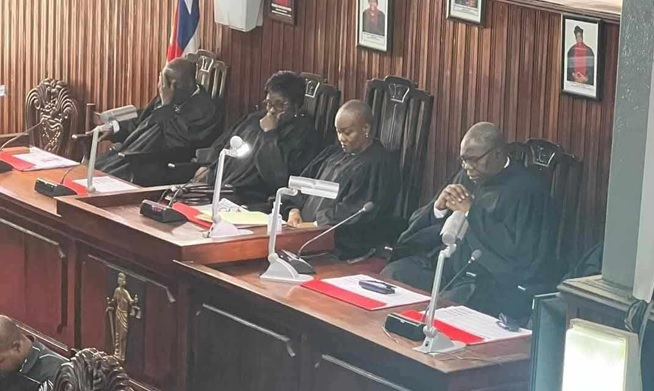MONROVIA, LIBERIA – Renowned activist and Master of Law (LL.M.) candidate Martin K. N. Kollie has delivered a detailed critique of the Supreme Court’s ruling in the case involving embattled Speaker J. Fonati Koffa and the Majority Bloc led by Representative Samuel G. Kogar. The decision, handed down on Friday, December 6, 2024, has left the nation divided, with Kollie describing it as a “vague verdict” that has only exacerbated the political crisis. His statement, titled “A Victoryless Legal Battle: A Vague Verdict Delivered by a Supreme Court that Acted Shrewdly – A Critique,” argues that the Court’s ruling avoided resolving critical questions and instead created room for further conflict.
Kollie began his critique by pointing out that while there is no legally binding timeframe for the Supreme Court to rule in such matters, the prolonged delay in delivering its judgment was unnecessary. He asserted that the decision, despite the time taken, failed to provide clarity on the central question of who acted constitutionally or unconstitutionally. According to Kollie, the Court’s ruling did not definitively declare which bloc was right or wrong, leaving both sides to claim victory and deepening the political divide within the Legislature and the country.
In his analysis, Kollie argued that the Court’s reluctance to take a firm stance has created a “cloud of own interpretation.” He observed that the decision has allowed subjective perspectives to dominate public discourse, with different factions interpreting the ruling in ways that suit their narratives. This ambiguity, he suggested, undermines the Court’s role as the ultimate arbiter of disputes and has thrown the issue into the hands of the Court of Public Opinion, which remains heavily divided.
Kollie critiqued the Supreme Court’s handling of Speaker Koffa’s 4-count petition, emphasizing that the Court evaded key issues raised by the embattled Speaker. He noted that Koffa’s petition sought to have the anti-Koffa bloc’s actions declared illegal and unconstitutional. However, the Court avoided making any specific determinations, focusing instead on interpreting constitutional provisions in a general manner. This approach, Kollie argued, failed to address the substantive concerns brought before the Court.
One of the central points of contention in Koffa’s petition was the legitimacy of the anti-Koffa bloc’s sitting. Kollie highlighted that the Court did not declare whether this sitting was legal or constitutional, leaving the matter unresolved. By avoiding a definitive ruling, the Court allowed both sides to continue their claims of legitimacy, further complicating the political landscape.
The activist also criticized the Court’s silence on the suspension of Representatives Edward Flomo, Abu Kamara, and Marvin Colle. Koffa had asked the Court to declare these suspensions illegal and unconstitutional, but the judgment neither affirmed nor rejected their validity. Kollie argued that this omission represents a significant failure to address a critical aspect of the case and leaves the affected lawmakers and their constituencies in a state of uncertainty.
Similarly, the Court sidestepped the issue of the restructuring of statutory committees, another key point in Koffa’s petition. Kollie noted that the Court did not provide any clarity on whether this action was constitutional, further fueling disputes within the Legislature. He expressed concern that the lack of a clear ruling on this matter undermines the rule of law and sets a dangerous precedent for future conflicts.
The activist was particularly critical of the Court’s failure to address the seizure of the 2025 draft national budget. Koffa had argued that this action by the anti-Koffa bloc was unconstitutional and sought the Court’s intervention. However, the judgment was silent on this issue, leaving a critical aspect of legislative governance unaddressed. Kollie described this omission as a missed opportunity to clarify the boundaries of legislative authority.
Kollie suggested that the Supreme Court’s reluctance to make definitive rulings reflects its adherence to the “Political Question Doctrine,” which discourages judicial interference in political matters. He argued that the Court’s cautious approach was driven by a desire to avoid being perceived as interfering in the affairs of another branch of government. While this may preserve the principle of separation of powers, Kollie contended that it comes at the expense of judicial accountability and effective dispute resolution.
The activist noted that the Court’s decision has significant implications for the broader political landscape. By refusing to take a clear stand, the Court has left the door open for continued conflict within the Legislature. Kollie warned that this ambiguity could undermine public trust in the judiciary and weaken democratic institutions. He called on all parties involved to prioritize dialogue and mediation as the only viable path toward resolving the crisis.
In his critique, Kollie also emphasized the need for systemic reform to address the root causes of the conflict. He argued that the ambiguities in Liberia’s Constitution and the Standing Rules of the Legislature are at the heart of the current crisis. Without clearer provisions, he warned, similar disputes are likely to arise in the future, further destabilizing the country’s governance framework.
Kollie’s critique extended to the broader implications of the Supreme Court’s ruling for Liberia’s democratic process. He expressed concern that the judiciary’s reluctance to address contentious issues could embolden political actors to exploit legal loopholes for personal gain. This, he argued, would erode public confidence in the rule of law and hinder efforts to build a more transparent and accountable government.
The activist called for a comprehensive review of Liberia’s legal and constitutional framework to prevent future crises. He urged lawmakers, civil society organizations, and other stakeholders to work together to strengthen the nation’s democratic institutions. Kollie argued that such reforms are essential to ensure that the judiciary can effectively fulfill its role as an impartial arbiter of disputes.
In his conclusion, Kollie reiterated the importance of dialogue and mediation in resolving the current impasse. He warned that the absence of a definitive resolution could have far-reaching consequences for Liberia’s political stability and governance. The Supreme Court’s ruling, he argued, should serve as a wake-up call for all stakeholders to prioritize the national interest over partisan politics.







